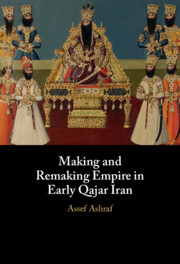
- Cited by 1
-
Cited byCrossref Citations
This Book has been cited by the following publications. This list is generated based on data provided by Crossref.
Brookshaw, Dominic Parviz 2024. “To dance like Solomon: imitation and martyrdom in a Qajarghazal”. Middle Eastern Literatures, p. 1.
- Publisher:
- Cambridge University Press
- Online publication date:
- October 2024
- Print publication year:
- 2024
- Online ISBN:
- 9781009361538
- Subjects:
- Middle East Studies, Area Studies, History, Middle East History


